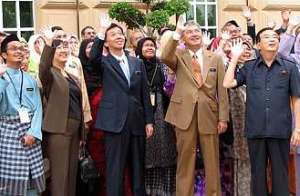KUALA LUMPUR: The creation of 334 posts
at all local authorities will help cut red tape and bureaucracy in the
processing and approval of development plans and certificates of fitness for
occupation (CF), said Housing and Local Government Minister Datuk Seri Ong
Ka Ting.
Ong said his ministry wanted to resolve all problems pertaining to CFs
before the implementation of the Certificate of Completion and Compliance (CCC),
which will replace the CF.
The minister said that more personnel to process applications would
ensure that local authorities were efficient “one-stop centres” for the
convenience of the people.
“This is also to make sure that the issuance of CCC will be faster and
effective without compromising the safety of buildings,” he said after
launching the World Habitat Day Conference 2005 yesterday.
Currently, the time it took to obtain the certificates varied among local
authorities, said Ong.
 |
|
HABITAT FOR HUMANITY: Ong greeting some of the participants at the
launch of World Habitat Day Conference 2005 in Kuala Lumpur on Monday.
|
“Some local authorities can give you the ‘ding-dong’ (runaround) for one
to two years, and this causes delays,” he said.
The ministry, he said, was rushing to ensure that amendments to the laws
and regulations were tabled in Parliament next March.
Earlier, in his speech, Ong said the country had achieved a number of
national development goals which covered essential elements of the
Millennium Development Goals (MDGs).
The MDGs represent the international community’s commitment to help the
world’s poor and implement the Millennium Declaration.
“One of the key items under the Habitat Agenda and the MDGs is the
eradication of poverty, which in Malaysia has decreased from 7.5% in 1999 to
5.1% in 2002,” he said.
The country’s urbanisation rate, he said, which had risen from 55.1% in
1995 to 61.8% in 2000, was expected to reach 66.8% this year. |